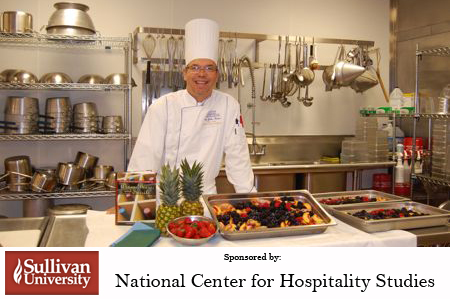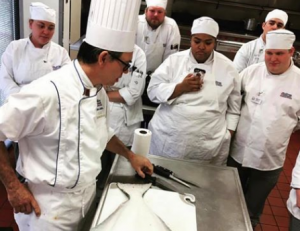Talk about stress, culinary finals are upon us beginning today through next week. The reality for some of my students is that they’re finishing their programs and moving into their externships. For others, it’s the next step to the next quarter. For all students, it should be the culmination of nine weeks of hard work, and hopefully the validation of the quality of their work.
There are many factors that play into finals week and make it far more pressure-packed then it should be. For the students that are concerned with their grades (for better or worse) practical finals typically take up a large percentage of the final grade. For the performance-based student, it is the actual day of final that causes them the most anxiety. They will play it cool and calm up until the final day and then get hit with the equivalent of the culinary “yips,” the day when every little thing is just slightly off. This steady drip is a drain on their confidence, and one of the main reasons why finals week and the actual day fill them with dread.

But hold on a minute, don’t these students prepare every day for the final day? Aren’t they groomed for that the moment they set foot in their first lab? The answers are yes, and yes, but that doesn’t make the moment of truth any less nerve-wracking.
What they could do to calm themselves is to realize that every day for the rest of the careers, they will be doing a final with every plate they produce. With the concepts they develop, with the menus they create, they are basically doing their final over again. They are putting their creative ideas out in the open for everyone to share and comment on. Even more daunting is the new realization that the commentary is instantaneous and more widespread than it used to be. Social media has made critics of us all, and even the tiniest ripple can create a big wave. It amazes me sometimes that in the insular world of culinary education there is still the opportunity to reach thousands simply by posting one of your lab plates on your Instagram simply because you like it and maybe I did too!
Still, there is dread and uncertainty in some of what is accomplished these last few weeks. Have I done enough pre-planning? Can I accomplish all I’ve planned in one day? It’s the part of a culinary education that isn’t sexy, that doesn’t show up in videos or even in graduate interviews. Commonly they want to talk about how much fun the lab was, how cool it was to work with different stuff. They will not easily admit that there was more too it, the dry side of the business that has to do with time goals or prep lists, that is the quiet side of the business that still needs to be taught, discussed and absorbed.

If you fixed Thanksgiving dinner or are planning a Christmas party, then you know what I mean. If you’re serious about this profession, then you know that you use those skills every day. They not only make you a better cook, they also pave the way for growth and advancement in an industry that is constantly changing. It’s not enough to know the latest technology or trendy ingredient, you need to know how to use it effectively. I don’t have time in the restaurant to constantly monitor prep lists, but I make it a point, ad nauseum to hammer it home in class.
Consider as well that if you’re smart, you use these skills in life, daily. It would be crazy to run off to the grocery store without a shopping list, or your coupons, crash a Black Friday sale with no idea of what you’re looking for. It would be a colossal waste of time. Time is something in short supply when you’re running a restaurant kitchen.
This may sound silly, but let’s stop a moment and consider something. In this busy holiday season, with practical finals, papers to write, gifts to buy, the one act that may save us will take us some time to do. You may have to stop and plan each step in your day in order to alleviate the stress and accomplish your goals. Taking a page from successful chefs, a notebook, a sketch pad, even an iPad can be a lifesaver as you map out steps, plan plating arrangements and even create an order sheet for ingredients. I’ve done this for 40 years and still can’t rely solely on my memory. Too many details and too much energy goes into a typical restaurant day, and the same is true for school. If someone tells you they’ve got it, it won’t be for long.
Which brings me back to this week and next, and the pressures that start to build. I tell my students the same thing I tell my cooks, slow it down to speed it up. Consider every step’s importance in the whole process and whether you can consolidate those steps to become efficient.
It’s not enough to see the end goal, you need to be able to recognize the steps as well. Conserve the energy you have by planning well and planning for contingencies. Have a clear sense of what you want to accomplish and how long you think it will reasonably take.
That advice can serve the holiday shopper as well, and that advice plus a warm meal every now and then will see you through to the new year, and my students successfully through their finals.

John Foster is an executive chef who heads the culinary program at Sullivan University’s Lexington campus. A New York native, Foster has been active in the Lexington culinary scene and a promoter of local and seasonal foods for more than 20 years. The French Culinary Institute-trained chef has been the executive chef of his former restaurant, Harvest, and now his Chevy Chase eatery, The Sage Rabbit.
To read more from Chef John Foster, including his recipes, click here.
























